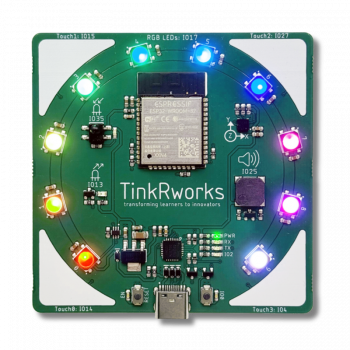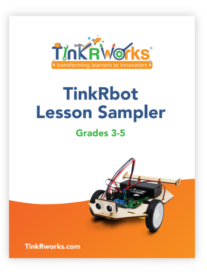
Project Description
A lot of science in a small package! This hand-held electronic circuit board — equipped with touch sensors, lights, sounds, remote control, and an accelerometer — can be programmed as an electronic board game, a light and sound show, a musical instrument, a speed reaction game, a balance device, or anything else students can think of. Unlike other coding platforms, students learn the fundamentals of coding principles through activities, thought experiments, class discussions, journaling, and guided and independent coding. They also explore and use real-life coding strategies to bring their ideas to life. Two grade-appropriate versions are available: Grades 3-5 and 6-8.
Key Concepts
Accelerometer, Algorithm, Capacitance, Coding, Command, Conditionals, Cones, Cone response, Debug, Doppler effect, Electrical components, Energy, For loops, Frequency, Infrared light, Iterative math, Light, Loop, Microcontroller, Pins, Pitch, Pixel, Printed Circuit Board (PCB), Program, Pseudocode, Random number generator, RGB colors, RGB pixel, Remote control, Serial output, Sound waves, Spatial dimensions, Subroutines, Switch/Case blocks, Tilt, Touchpads, Variables, Variable math, Wavelength
Essential Question
How can we use programming to turn a circuit board into an interactive game console?
Summary of Standards
Computer Science Teaching Association Standards (CSTA)
Students will model how software and hardware work together to accomplish tasks; create programs that include sequences, events, loops, and conditionals; and test and debug a program or algorithm to ensure that it runs as intended.
Common Core ELA
Students will learn new content-specific vocabulary terms, participate in collaborative group discussions, and draw relevant conclusions based upon the curriculum that is presented.
Common Core Math
Students will interpret products of whole numbers, identify arithmetic patterns, and compare whole numbers.
Texas Essential Knowledge and Skills (TEKS)
Students will use context within and beyond a sentence to determine the meaning of unfamiliar words and multiple-meaning words. They will develop social communication such as conversing politely in all situations. Students will listen actively, ask relevant questions to clarify information, and make pertinent comments. They will respond to conversations using newly acquired vocabulary as appropriate. They will use mathematics skills to determine the total number of objects when combined and arranged in arrays.
Computer Science Teaching Association Standards (CSTA)
Students will model how software and hardware work together to accomplish tasks, create variables to represent data, develop programs that combine control structures and design programs.
Common Core ELA
Students will learn new content-specific vocabulary terms, participate in collaborative group discussions, and draw relevant conclusions based upon the curriculum that is presented.
Common Core Math
Students will use variables to represent quantities.
Texas Essential Knowledge and Skills (TEKS)
Students will participate in student-led discussions by eliciting and considering suggestions from other group members, taking notes, and identifying points of agreement and disagreement. They will make inferences and use evidence to support understanding. They will follow and give complex oral instructions to perform specific tasks, answer questions, or solve problems. They will use mathematics skills to write corresponding real-world problems given one-variable, one step equations or inequalities.
Request Info
Fill out the form below or schedule a demo to learn more. A School Partner will follow up and help answer any questions.

